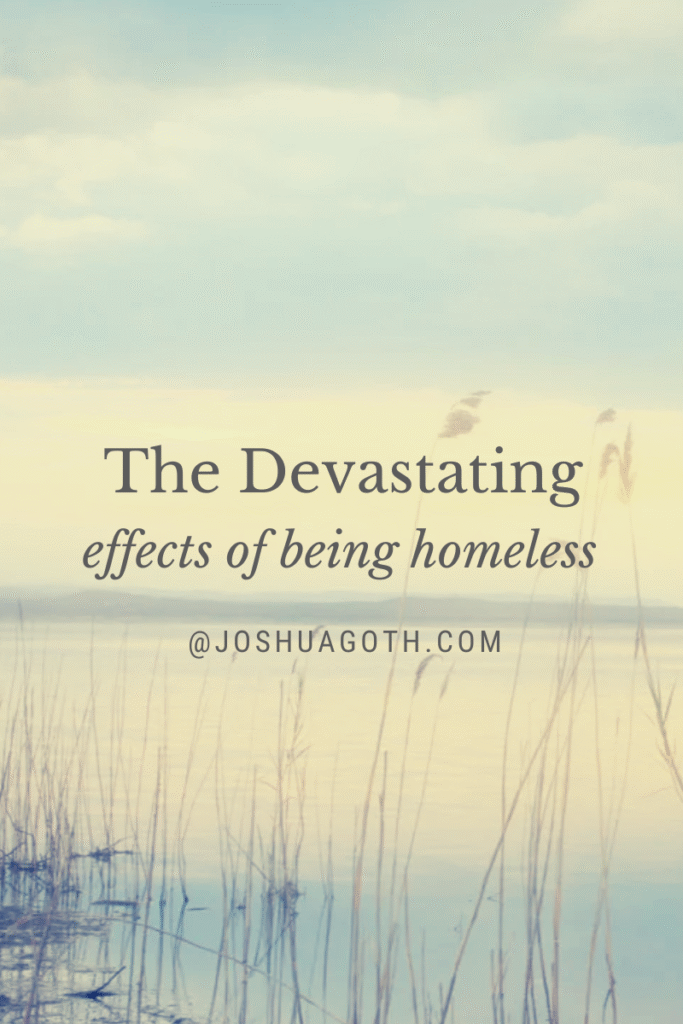Homelessness is more than just the absence of a physical shelter; it’s a profound disruption to one’s sense of security, identity, and belonging. The psychological toll it exacts can be devastating, and the longer one remains without a home, the deeper these mental wounds can become.
I have found myself without a home more times than I care to write about. One of my earliest childhood memories was my mother bathing me in a sink at a homeless shelter after escaping from domestic abuse. Since then, I have had bouts of homelessness as a runaway teenager, and lastly, in 2021. The long term effects of being homeless are damaging, but with proper support, you can help recover from many traumas that homelessness can inflict.
Understanding the Psychological Impact of Homelessness
The duration of homelessness significantly influences the severity of psychological effects. Psychological effects can last for years, continuing long after you have found stability
The following psychological effects can last for years, continuing long after you have found stability.
- Anxiety: Constant worry about where to go, what to do, and how to survive.
- Depression: Feeling hopeless, disconnected, and worthless due to lack of a stable home environment.
- Trauma: Emotional distress from experiencing violence, abuse, or neglect during homelessness.
- Post-Traumatic Stress Disorder (PTSD): Flashbacks, nightmares, and avoidance behaviors stemming from traumatic experiences while homeless.
- Mental Health Issues: Increased risk of developing mental health conditions like schizophrenia, bipolar disorder, or major depressive disorder.
Short-Term Effects:
- Sleep Disturbances: Difficulty sleeping due to noise, stress, or lack of a safe environment.
- Nutritional Deficiencies: Limited access to healthy food options, leading to malnutrition and related health issues.
- Infections: Higher risk of contracting illnesses like respiratory infections, skin problems, or gastrointestinal disorders.
- Mental Fatigue: Chronic exhaustion from dealing with the stress of homelessness.
Long-Term Effects:
- Chronic Health Conditions: Increased risk of developing chronic conditions like diabetes, hypertension, or heart disease due to poor living conditions and limited access to healthcare.
- Cognitive Decline: Impaired cognitive function due to a lack of stable housing, education, and employment opportunities.
- Social Isolation: Difficulty forming connections with others, leading to feelings of loneliness and disconnection.
Common causes that can lead to homelessness
- Poverty: Inadequate income or assets to afford safe and secure housing.
- Domestic Violence: Escaping abusive relationships without a stable place to go.
- Mental Health Issues: Struggling with mental health conditions that make it difficult to maintain employment, social connections, or a home.
- Substance Abuse: Addictions to drugs or alcohol leading to job loss, relationship problems, and financial struggles.
- Unemployment: Job loss due to economic downturns, industry changes, or lack of skills.
- Eviction: Being forced out of a rental property due to non-payment of rent, lease violations, or other issues.
- Trauma and Crisis: Unaddressed trauma, crisis situations (e.g., domestic violence), or mental health issues leading to homelessness.
A Message of Hope: Turning Adversity into Opportunity
As I reflect on my journey, I’ve come to understand that the common thread throughout each episode of homelessness was not external circumstances, but rather my own decisions – both good and bad. The hardest part was knowing that my daughter had to witness her father struggling, feeling helpless as I navigated the challenges of being without a home. But in hindsight, I realize that showing her strength wasn’t just about what happened, but how I responded.
The road to recovery is not always easy, but it’s possible. There are numerous programs and resources available to help individuals break free from the cycle of homelessness. Looking back, I’m grateful for the hardships I faced, as they have shaped me into the person I am today. In my next blog post, I’ll explore the importance of taking responsibility for one’s life and the benefits that come with it.
Resources:
- National Coalition for the Homeless (NCH): www.nationalhomeless.org
- The Salvation Army: www.salvationarmyusa.org
- Housing and Urban Development (HUD): www.hud.gov
- Substance Abuse and Mental Health Services Administration (SAMHSA): www.samhsa.gov



